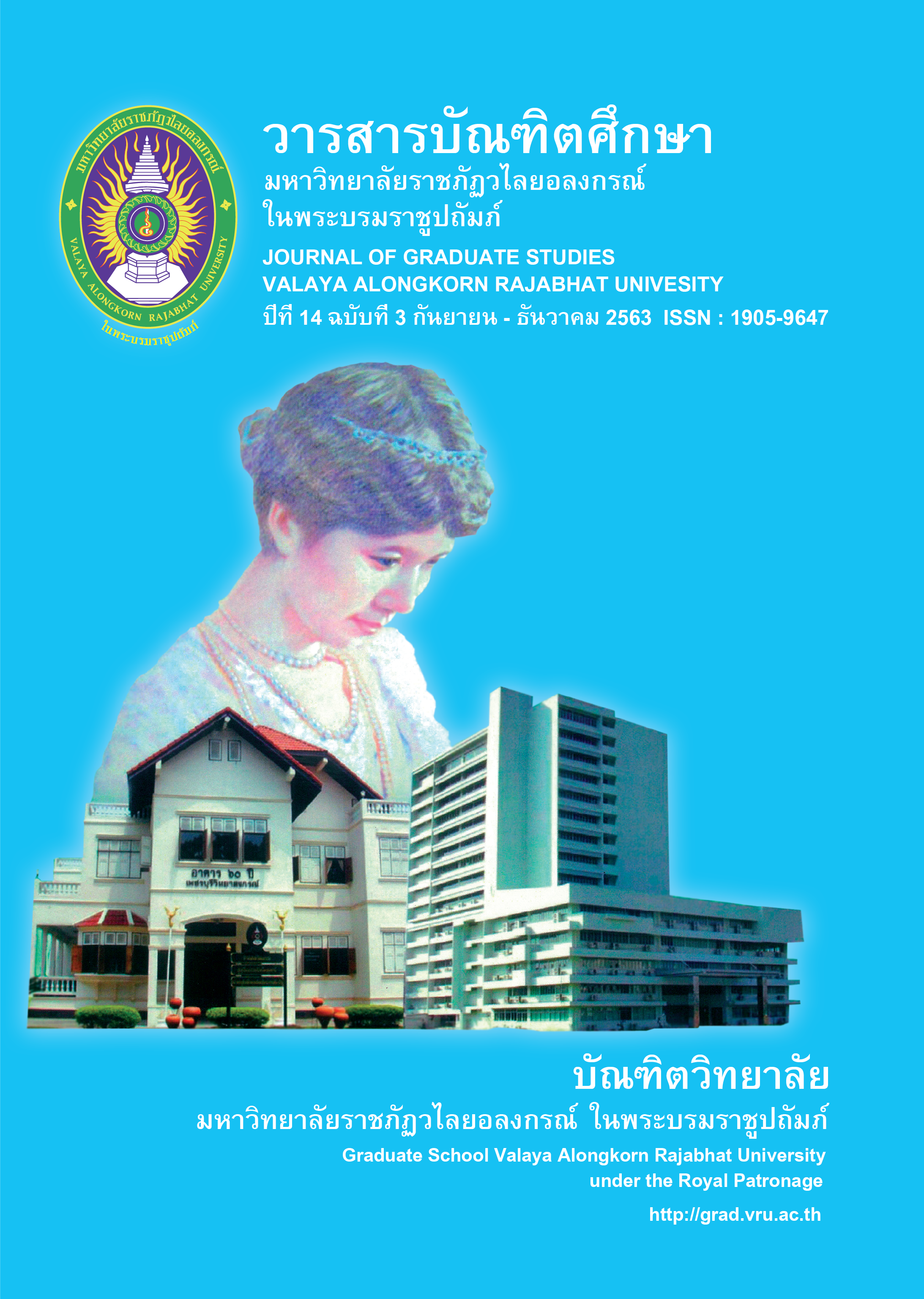CHARACTERISTICS OF ADAPTIVE INTERNET USER IN THAI ADOLESCENTS
Main Article Content
Abstract
This research aimed to study the characteristics of adaptive internet user in Thai adolescents. The researcher used semi-structured in-dept interviewing, a qualitative research method, with key informants. The sample used in this research included 3 experts on internet using behavior, 3 adolescents using the internet adaptively, and 3 adolescents with internet addiction selected by a purposive sampling technique. The adaptive usage of internet was used as a concept for interviewing. Qualitative data were analyzed through content analysis. Findings showed the 7 characteristics of adaptive internet user in Thai adolescents: 1) doing activities adaptively, 2) prioritizing activities, 3) planning for proper use, 4) doing activities as planned, 5) following up, 6) using other activities as alternatives, and 7) being a role model. The findings helped to understand more about the characteristics of adaptive internet user in Thai adolescents. Moreover, these could apply to build the characteristics of adaptive internet user within oneself. The specialists, such as teachers, psychologists, technical officers, and psychiatrists, could use these results with the treatment or prevent the internet addiction in Thai adolescents.
Article Details

This work is licensed under a Creative Commons Attribution-NonCommercial-NoDerivatives 4.0 International License.
บทความทุกเรื่องได้รับการตรวจความถูกต้องทางวิชาการโดยผู้ทรงคุณวุฒิ ทรรศนะและข้อคิดเห็นในบทความ Journal of Global of Perspectives in Humanities and Social Sciences (J-GPHSS) มิใช่เป็นทรรศนะและความคิดของผู้จัดทำจึงมิใช่ความรับผิดชอบของบัณฑิตวิทยาลัย มหาวิทยาลัยราชภัฏวไลยอลงกรณ์ ในพระบรมราชูปถัมภ์ กองบรรณาธิการไม่สงวนสิทธิ์การคัดลอก แต่ให้อ้างอิงแหล่งที่มา
References
Boonyapitruksagoon, K. & Poonpol, P. (2019). patčhai thī kīeokhō̜ng kap phrưttikam kānchai sư̄ sangkhom ʻō̜nlai yāng rūthao than khō̜ng naksưksā parinyā trī nai khēt Krung Thēp Mahā Nakhō̜n læ parimonthon [Factors related to using social media behavior and media literacy in universities in Bangkok metropolitan area]. Journal of Behavioral Science. 25(2), 39-59.
Brand, M., Young, K. S., & Laier, C. (2014). Prefrontal control and internet addiction: A theoretical model and review of neuropsychological and neuroimaging findings. Frontiers in Human Neuroscience. 8(375), 1-12.
Calvo-Frances, F. (2016). Internet abusive use questionnaire: Psychometric properties. Computers in Human Behavior. 59, 187-194.
Davis, R. A. (2001). A cognitive-behavioral model of pathological internet use. Computers in Human Behavior. 17(2), 187-195.
Dreier, M. et al. (2013). The development of adaptive and maladaptive patterns of internet use among European adolescents at risk for internet addictive behaviors: A grounded theory inquiry. European Psychiatry. 28(Suppl 1), 1.
Electronic Transactions Development Agency. (2019). Wai sai wai kao chalāt rūnet [Internet for better life]. Retrieved from https://www.etda.or.th/ publishing-detail/internet-for-better-life-handbook.html.
Griffiths, M. (2005). A ‘components’ model of addiction within a biopsychosocial framework. Journal of Substance Use. 10(4), 191-197.
Hootsuite. (2020). Digital 2020 Thailand (January 2020) v01 [PowerPoint slides]. Retrieved from http://www.slideshare.net/DataReportal/digital-2020-thailand-january-2020-v01.
Janpipatpong, T. (2016). patčhai phāinai bukkhon læ saphāpwǣtlō̜m thāng sangkhom thī kīeokhō̜ng kap phrưttikam kānchai fētbuk dūai panyā khō̜ng naksưksā parinyā trī nai khēt Krung Thēp Mahā Nakhō̜n [Personal and social environmental factors related to intellectual Facebook consumption behavior of undergraduate students in Bangkok metropolis]. Master’s thesis. Srinakharinwiort University.
Joyrod, P. (2009). patčhai thī mī phon tō̜ phrưttikamkān rap sư̄ ʻintœ̄net yāng mī wičhāranayān khō̜ng nakrīan chūang chan thī sī nai khēt Krung Thēp Mahā Nakhō̜n [Factors affecting critical internet-consumption behavior of senior high school students in Bangkok]. Master’s thesis. Srinakharinwiort University.
Juinam, J. & Chantaranamchoo, N. (2015). phrưttikam læ phon čhāk kānchai khrư̄akhāi thāng sangkhom ʻō̜nlai khō̜ng nakrīan radap chan matthayommasưksā tō̜n ton nai čhangwat sukhōthai [The behaviors and effects of using social networks of the junior secondary school students in Sukhothai province]. Veridian E-Journal, Silpakorn University. 8(3), 84-95.
Kitisri, C., Nokham, R., & Phetcharat, K. (2017). phrưttikam kānchai samātfōn læ kānraprū phāwa sukkhaphāp khō̜ng naksưksā phayābān [A smartphone using behavior and health status perception of nursing students]. Community Health Development Quarterly Khon Kaen University. 5(1), 19-34.
Ministry of Culture. (2015). mārayāt nai kānchai ʻinthœ̄net [Network etiquette]. Retrieved from https://www.m-culture.go.th/young/ewt_news.php?nid=353
Phra Brahmagunabhorn (P. A. Payutto). (1997). Khon Thai kap theknōlōyī [Thai people and Technology]. Nakhon Pathom: Prayut Payutto.
Sanguankaew, W. (2016). Digital Citizens: phonlamư̄ang dičhithan [Digital Citizens]. Retrieved from https://www.stou.ac.th/study/sumrit/1-59(500)/page2-1-59(500).html.
Sareerasart, W., Vanindananda, N., & Suppareakchaisakul, N. (2012). patčhai chœ̄ng sāhēt dān sathānakān thāng sangkhom læ kānmī phūmkhumkan thāng čhit thī kīeokhō̜ng kap phrưttikam kānchai ʻinthœ̄net yāng sāngsan læ plō̜tphai khō̜ng nakrīan ying radap matthayommasưksā nai rōngrīan thī khaorūam læ mai khaorūam khrōngkān songsœ̄m kānchai ʻinthœ̄net yāng sāngsan læ plō̜tphai [The relationships among social situations and psychological immunity to internet behavior focusing on safety and usefulness of female students in high schools with or without internet safety project]. Journal of Behavioral Science of Development. 4(1), 1-13.
Sawandee, P. (2011). kānsưksā khwām tranak rūtō̜ ʻakānchai ʻinthœ̄net yāng sāngsan læ plō̜tphai khō̜ng nakrīan chan prathomsưksā pī thī hā rōngrīan bān nō̜ng nam khun thī rīan dūai botrīan khō̜mphiutœ̄ mantimīdīa rư̄ang thaksa kānchai sư̄ ʻinthœ̄net [The study of awareness to using internet by creativity and safety of Prathomsuksa 5 students, Nongnumkoon school by used the multimedia computer on using internet skill]. Independent study. Srinakharinwiort University.
Thongkambunjong, W., Choochom, O., Intasuwan, P., & Suppareakchaisakul, N. (2011). patčhai chœ̄ng hēt læ phon khō̜ng phrưttikam tit ʻinthœ̄net khō̜ng nakrīan matthayommasưksā nai khēt Krung Thēp Mahā Nakhō̜n [Causal factors and effect of internet dependency behavior of high school students in Bangkok metropolis]. Journal of Behavioral Science. 17(2), 103-119.
Tzavela, E. C. et al. (2015). Processes discriminating adaptive and maladaptive internet use among European adolescents highly engaged online. Journal of Adolescence. 40, 34-47.
Young, K. S. (1996). Internet addiction: The emergence of a new clinical disorder. Cyber Psychology and Behavior. 1(3), 237-244.
Young, K. S. (2007). Cognitive behavior therapy with Internet addicts: Treatment outcomes and implications. Cyber Psychology and Behavior. 10(5), 671-679.
Zimbardo, P. G. & Gerrig, R. G. (1999). Psychology and life. 15th ed. New York: Longman.


